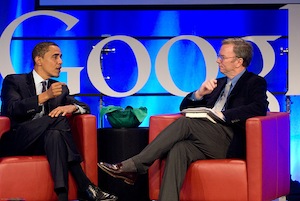The PRISM Nine (technically only seven since two have been bought out by others), the companies that have been confirmed to have allowed the NSA direct server access to Americans’ private data, seem content with overt lies as an official response, but just because the administration is set to protect them from legal fallout doesn’t mean they’re going to get off scot-free.
 Google, Facebook, Microsoft, Apple, Yahoo, AOL and Paltalk have all been caught with their hands in a might shady cookie jar. All these companies had faced customer concerns about privacy, and at this point their credibility on the issue is thoroughly shot: there is no reason to trust any of them, especially since they refuse to come clean on what we already know they did.
Google, Facebook, Microsoft, Apple, Yahoo, AOL and Paltalk have all been caught with their hands in a might shady cookie jar. All these companies had faced customer concerns about privacy, and at this point their credibility on the issue is thoroughly shot: there is no reason to trust any of them, especially since they refuse to come clean on what we already know they did.
The companies surely made some friends on Capital Hill, but all seven are overwhelmingly dependent on individual Americans as customers. Even if their collective hold on the Internet at the moment is pretty strong, their trust is a major casualty, and one that could have long-term ramifications as they compete for market share with untainted rivals.
Even the excuse that they were ‘forced’ to cooperate doesn’t fly, as Twitter, one of the companies conspicuously absent from PRISM, is said to have simply refused to comply, and that was that. The other companies not only agreed, but in some cases went to great expense to alter their systems to be more surveillance-friendly, and facilitate a surveillance culture unprecedented in scope in the history of mankind.


